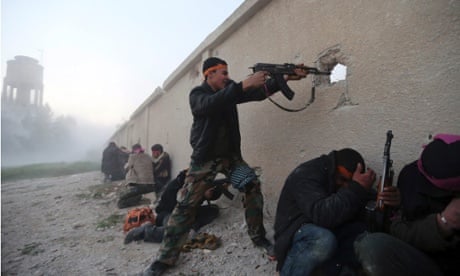The world's costly drift away from peace continued last year, with nations spending an estimated $9.8trn (£5.8trn) on containing and dealing with violence, according to the latest annual Global Peace Index (GPI).
The 2014 index shows that worldwide peace deteriorated slightly for a seventh consecutive year as a result of the conflicts in Syria, South Sudan and Central African Republic (CAR), tensions over Ukraine and increased terrorism in Afghanistan, Iraq, the Philippines and Libya.
The fighting in Syria saw the country supplant Afghanistan as the world's least peaceful nation, while six months of conflict in South Sudan led to it plummeting 16 places down the index and coming third. Behind it came Iraq, Somalia, Sudan, CAR, the Democratic Republic of the Congo, Pakistan, North Korea and Russia.
The cost of violence in 2013 – which was equivalent to 11.3% of global GDP – was slightly higher than the previous year, when the bill came in at $9.46trn, or 11% of GDP.
Steve Killelea, the founder and executive chairman of the Institute for Economics and Peace (IEP) thinktank, which produces the GPI, described the sums spent on the impacts of violence as staggering.
"This is resulting in very real costs to the world economy; increases in the global economic impact of violence and its containment are equivalent to 19% of global economic growth from 2012 to 2013," he said.
"To put this in perspective, this is around $1,350 per person."
However, said Killelea, the true costs could be twice as high as some data cannot be obtained. "We can only count what we can count."
He added that although major international conflicts were becoming less common, the same could not be said of internal conflicts.
"That trend seems to be on the rise, but what's important to realise is that it's still in only a small number of nations and in a small number of regions," he said, adding that Europe, North America and the Asia-Pacific region all remained broadly peaceful.
"There's only 11 countries we describe as being in absolute conflict, but there are 500 million people in those nations – and 200 million of them live on under $2 a day."
The IEP ranks the peacefulness of nations using 22 qualitative and quantitative indicators, gauging peace in 162 independent states according to safety and security in society, levels of domestic and international conflict and the degree of militarisation.
Iceland tops the 2014 index, followed by Denmark, Austria, New Zealand, Switzerland, Finland, Canada, Japan, Belgium and Norway. The UK is ranked the 47th most peaceful nation, one spot above France, while the US is ranked 101st.
The 10 countries identified as most at risk of small to medium deteriorations in peace – classed as a 5% drop on the GPI score – were Zambia, Haiti, Argentina, Chad, Bosnia and Herzegovina, Nepal, Burundi, Georgia, Liberia and Qatar.
Killelea said that although peace in a country such as Argentina (No 43) had improved dramatically over the past few years, the gap between its actual levels of peace and the levels of peace that its institutional strength ought to guarantee suggested a risk of deterioration.
He said that Qatar – another highly peaceful nation according to the index (No 22) – was in the same bracket because of its performance in areas such as corruption and acceptance of the rights of others. Qatar's controversial labour laws, laid bare in a Guardian investigation, have been criticised as the country prepares to host the 2022 World Cup. The bid has also been dogged by allegations of corruption.

